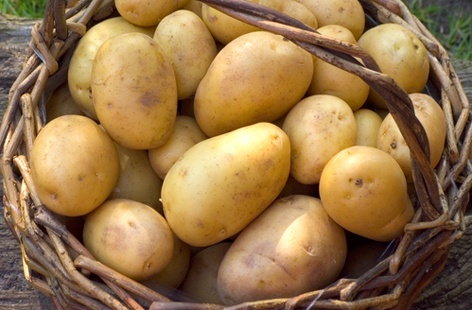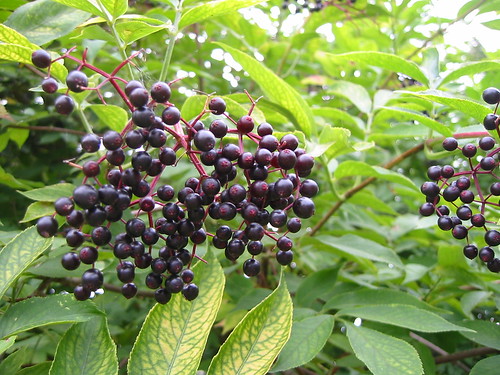Potatoes already have a well-deserved reputation as a fattening food but, are they also toxic?
 |
| Photo credit: realfood.tesco.com |
It is no surprise the fact that potatoes are associated with
overeating, diabetes, obesity and heart disease1 given their high glycemic load.
This means that they spike your blood sugar and insulin to rapidly plunge it
down, making you feel hungry just after eating. What is not so well-known is
that their glycoalkaloid content can
be extremely harmful and acutely toxic to humans.
Glyco... what??
Glycoalkaloids are a natural-occurring pesticide that some plants produce in order to protect themselves when attacked by fungi, viruses, bacteria or insects. There are several types but the main ones found in potatoes are a-solanine and a-chaconine. There are two mechanisms by which they impair your health:
Firstly, they disrupt your epithelial barrier as they breach
your cells by attaching to their cholesterol membranes. This could be
detrimental to your mucosal immune system and your intestine, worsening or/and
leading to conditions such as inflammatory bowel disease (IBD).2,3
 |
| Photo credit: hexpek.blogspot.com |
 |
| Photo cred: Elite Nootropies |
Secondly, they are neurotoxins that hinder your body's capacity to regulate acetylcholine. This is a crucial neurotransmitter that sends nerve impulses from motor neurons to skeletal muscles activating muscle action. Glycoalkaloids stop the enzyme cholinesterase from breaking down acetylcholine, leading to an accumulation of the neurotransmitter and an overstimulation of the cells. As a result, you get a plethora of unpleasant symptoms which include4:
- Convulsions
- Delirium
- Diarrhoea
- Dilated pupils
- Fever
- Hallucinations
- Headache
- Loss of sensation
- Hypothermia
- Paralysis
- Shock
- Slow pulse
- Slowed breathing
- Abdominal pain
- Vision changes
- Vomiting
- Nausea
- Fatigue
- Death
In spite of the detrimental effects this chemical has, the
oral toxicity is relatively low because of their poor absorption. Provided you
have a healthy gastrointestinal tract, the solanine
will be eliminated through the urine and faeces within 12 hours while your gut
microbiome detoxifies your system by converting the toxin into solanidine, a less harmful compound6.
Food safety
 |
| Photo credit: |
Human studies have shown that even 1mg of glycoalkaloid per kg of body weight can
be noxious whereas 3 mg/kg might be deadly. The safety limit for glycoalkaloid content is about 20 mg per
100 g (<0.25Ib.) of potato. The peel (3 to >100mg/100g) contains 3 to 10
times more glycoalkaloids than the
flesh (0.10 to 4.50 mg/100g). Therefore,
if you are going to consume potatoes you can dramatically reduce the toxic
content just by peeling it. Avoid by all means eating the sprouts, any green
area or unripe potatoes as they contain hazardously high amounts of the toxin.
 |
| Photo credit: |
Storage conditions, namely light and heat, influence solanine concentrations. Try to keep
them in a dark and cool place as light increases the synthesis of solanine by 20% , while temperature can
do the same (at 24°C/75°F the rate of formation is 2 times greater than at
7°C/45°F).5
Unfortunately, the toxic content is not significantly
lowered by any means of cooking. In fact, studies have shown that frying concentrates
glycoalkaloids.3
Other related foods7
 |
Potatoes are part of the Nightshade (Solanaceae) Family which were not considered fit for human
consumption before the 1800's given the toxicity of some varieties like the atropa belladonna (deadly nightshade).
Other members of this family include tomatoes and eggplant.
Are they also poisonous? Not really or, at least, not as
much:
Tomato glycoalkaloid
levels drop drastically when ripen going from around 50 mg/100g in green
tomatoes to about 0.5mg/100g in red tomatoes, making potatoes 20 times more
toxic. There has not been conducted any human study, but the median lethal dose
in rodents is 500mg per kg of body weight.
 |
| Photo credit: www.gardeningknowhow.com |
Eggplants are considerably safer than potatoes as their solanine content goes from 1 to 2mg/100g.
As with the tomatoes, I do not know about any human study but, in rodents, the
median lethal dose is 1.75 mg per kg of body weight.
Nightshade sensitivity is a whole other topic that I will
address in a forthcoming post.
References and recommended readings
1. "The Problem with Potatoes." The Nutrition
Source. Harvard T.H. Chan School of Public Health, 24 Jan. 2014. Web.
2. Iablokov V, Sydora BC, Foshaug R, Meddings J, Driedger D,
Churchill T, and Fedorak RN. "Naturally Occurring Glycoalkaloids in
Potatoes Aggravate Intestinal Inflammation in Two Mouse Models of Inflammatory
Bowel Disease." National Center for Biotechnology Information. U.S. National
Library of Medicine, Nov. 2010. Web.
3. Patel B, Schutte R, Sporns P, Doyle J, Jewel L, and Fedorak
RN. "Potato Glycoalkaloids Adversely Affect Intestinal Permeability and
Aggravate Inflammatory Bowel Disease." National Center for Biotechnology
Information. U.S. National Library of Medicine, Sept. 2002. Web.
4. "Potato Plant Poisoning - Green Tubers and Sprouts:
MedlinePlus Medical Encyclopedia." Medline Plus. U.S. National Library of
Medicine, 21 Oct. 2013. Web.
5. Cantwell, Marita. "A Review of Important Facts about
Potato Glycoalkaloids." Agriculture and Natural Resources. University of
California, Aug. 1996. Web.
6. Montario, Andrew. "Potato Glycoalkaloid Toxicity:
Solanine." Safe Spectrum Lighting. Cornell University. Web.
7. Ede, Georgia. "How Deadly Are Nightshades?" Diagnosis: Diet. 6 Jan. 2013. Web.
Maintain a healthy lifestyle by doing what is right for your body. Vyfat 120 mg Capsule is a medicine used in individualized low-calorie, low-fat diet and exercise program to help people lose weight. Prescription orlistat is used in overweight people who may also have high blood pressure, diabetes, high cholesterol, or heart disease. Orlistat is for use only in adults.
ReplyDelete